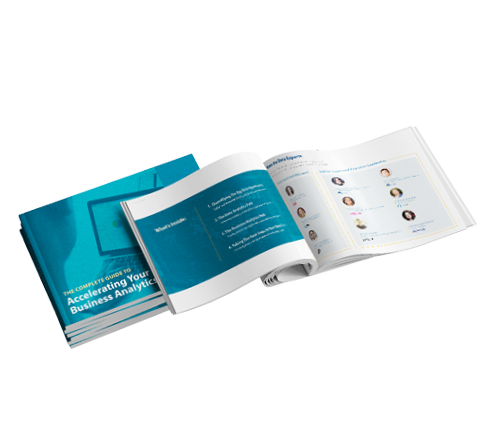Request Information
We're Sorry
There was an unexpected error with the form (your web browser was unable to retrieve some required data from our servers). This kind of error may occur if you have temporarily lost your internet connection. If you're able to verify that your internet connection is stable and the error persists, the Franklin University Help Desk is available to assist you at helpdesk@franklin.edu, 614.947.6682 (local), or 1.866.435.7006 (toll free).
Just a moment while we process your submission.

Should I Pursue a Career in Data Analytics?
Data is everywhere these days. Big data, small data, structured data, unstructured data; and every company wants to leverage it.
Big corporations, small businesses, nonprofits and even the average person all create, capture and store massive amounts of data every day. But once they have all this data, many don’t know how to make sense of it. That’s where data analytics comes into play.
Does diving deep into the data deluge the world is facing sound like a career you’d consider? Unsure where and how to start? Are you ready to look into the growing data analytics field, explore positions and specialization paths, and examine ways you can start building your data analytics career?
Five Reasons Why Data Analytics is a Great Career Choice
If you’re interested in data analytics but still not sure it’s a solid choice to pursue for your career, here are five reasons why you should consider it.
1. Demand For Data Analysts Will Be High Through 2030
Data analytics is a fast-growing field and it will continue to grow over the next decade. The U.S. Bureau of Labor Statistics (BLS) estimates 22% growth through 2030, which is considered much faster than average. This means that more than 3,000 positions will need to be filled annually.
2. Pay is Competitive for Data Analysts
Another attractive quality of a data analytics position is the pay. The BLS reports the mean annual salary is $103,930 for data science and analyst positions in 2022. It’s worth noting that more senior positions can earn up to $130,000 or more.
Depending upon the type of industry a data professional is working in, pay can climb even higher with sign-on and yearly bonuses or alternative forms of compensation like stock options or equity packages.
3. Data Analysts Can Be Leaders at Any Point Along Their Career Path
Upon entering the field, a data professional often has several career paths to choose from. Some paths are paved with promotions and additional levels of responsibilities. Other paths can include specializations and positions within specific industries of interest. Some professionals may choose to go the route of a freelancer or consultant and be their own boss.
No matter what path you may take or at what level of your career path you may find yourself, it’s important to remember the value you bring to any business in any industry. The data analyst role helps an organization make better decisions, be more competitive, or even shape the workforce culture. Because the information you provide is critical to a business’s bottom line, you have the opportunity to be a data-driven leader.
Explore what just one data analytics career path looks like in the graphic below.

4. All Industries Need Data Analysts
All industries collect and store data, which means all of them also need data analysts to extract actionable insights. If you find yourself interested in a particular industry, it may be worth exploring a data analytics degree program further.
Get a FREE roadmap that includes insider information to help you maximize the many opportunities in the fast-growing field of Big Data.
5. There is Always A New Challenge, Problem to Solve or Tool to Learn
The near-daily increase in available data points means information is always available to you. Sometimes you’ll use data that is organically produced, other times you’ll need to gather your own data by conducting surveys or tracking website traffic, and there may even be a need to buy data from companies that specialize in data collection.
The way you choose and then clean, model, and interpret that data will change based on where it originated, the challenges you have set out to navigate, the solutions to discover, all of the business decisions to make, and knowing which problems you need to solve.
The results will dictate how you present your findings. Turning your data insights into visualizations, charts, graphs or reports will be key to helping the business and other stakeholders understand the impact of your findings. Plus, because the data analytics field is always advancing and changing, you’ll have a consistent stream of new tools to learn, reasons to be excited and ways to stay engaged and contribute to your team’s success.
Breaking Into the Data Analytics Field
The first step in beginning your data analytics career starts with earning a bachelor’s degree. Typically, when people are interested in pursuing a data analytics career, they have a more technical background. That is not always the case, though. Many people apply and are accepted to colleges or universities who don’t have knowledge in statistics or programming.
No matter what level of foundational data knowledge you have, Nimet Alpay, Ph.D., program chair, M.S. in Data Analytics at Franklin University, offers some sound advice when researching and applying to a college or university:
- Examine the admission requirements of the program you’re interested in.
- If you don’t meet the stated requirements, complete whichever steps you need to qualify.
- If you do meet the requirements but feel like you may have forgotten prerequisite topics, take an online training course via Coursera, LinkedIn or Udemy to refresh yourself.
- Additionally, it may be smart to either refresh your basic statistics knowledge or get introduced to Python or R programming.
“Many of the training courses people can take to better prepare for their data analytics education are very affordable–if not free–and can really boost their confidence and foundational knowledge,” adds Alpay.
Once you’ve obtained your bachelor’s degree, you can begin exploring and applying for entry-level positions, such as:
- Data Analyst | Average Pay: $93,725
Data analyst is a common, entry-level role responsible for processing large amounts of information to generate insights, often through the use of assorted analytical tools. - Data Scientist | Average Pay: $126,818
Data scientists hone machine learning systems and algorithms to model recent developments and predict new ones. - Business Analyst | Average Pay: $87,651
A business analyst makes use of data to answer questions about business strategy, often visualizing data through tools such as Excel, Tableau and Powerpoint. - Software Engineer | Average Pay: $110,136
This role centers around the intersection of data science and programming. Software engineers design new software systems and maintain or improve existing ones.
Specializing in the Data Analytics Field
Nearly all industries need data analysts. Luckily for you, that means if you find a particular industry or type of business interesting you could transfer your data analytics skills and experience to that industry. Here are some popular specialized data analytics positions and their pay. You’ll see that some positions can act as a lateral move if you’re in an entry-level position or a promotion if you’ve earned the proper years of experience. Here are some roles you can specialize in your data analytics career:
- Research Analyst | Average Pay: $65,811
Research analysts comb through large amounts of publicly available market information and extract insights for companies that are buying, investing or selling products or services. People in this position often specialize in finance, equity or investment markets. - Marketing Analyst | Average Pay: $65,811
Marketing analysts study market conditions to determine the potential for sales of products or services. The insights analysts glean help companies understand what consumers want, determine target demographics and figure out ideal price points for products. - Risk Analyst | Average Pay: $87,911
Risk analysts typically work for financial institutions and insurance companies. They look at financial documents, economic conditions and potential clients to help companies determine the risk level of certain business decisions. - Operations Analyst | Average Pay: $86,195
Operations analysts analyze large amounts of information related to a business and its departments to identify and solve issues related to the business’ performance. - Business Intelligence Analyst | Average Pay: $98,275
Business intelligence analysts gather and analyze business intelligence data to provide insights about competitors and the marketplace. - Healthcare Analyst | Average Pay: $84,758
Healthcare analysts can work for hospitals, healthcare systems, pharmaceutical companies or other practices. They gather and analyze a variety of healthcare-related data such as: clinical, claims and costs, public health, pharmaceutical, patient satisfaction and behavior to solve problems related to patient care or improving processes. - Budget Analyst | Average Pay: $78,978
Budget analysts work across a variety of industries–from media to higher education to federal government or private sector businesses. They gather data related to a company’s financial situation and provide insights to leadership to improve downward trends or sustain growth.
Advancing in the Data Analytics Field

Many students will go on to earn a master's degree in data science and analytics, which is often necessary to advance in the field.
“If you’re confident that you’ll eventually want to move into a higher-level or management position in data analytics, obtaining a master's degree in data science and analytics is nearly always required,” says Alpay.
The majority of data analysts have advanced degrees. According to Burtch Works Executive Recruiting (2018) 89% of employees in data science and analytics positions, with less than three years of experience, had earned a graduate degree and that the proportion of early-career data science and analytics employees entering the job market with a master's degree has steadily increased from 48% (2015) to 69% (2017).
If investing the time and money into earning a master's degree isn’t possible for your situation, a graduate certificate may be a good alternative.
“Graduate certificates give students the opportunity to build in-demand skills quickly–typically in about half of the time a master's degree takes,” says Alpay. “Certificates are also a good option for people who are interested in going into data analytics but have an undergraduate degree in a non-STEM background. Many certificate programs don’t require students to have science or math experience.”
Once you’ve completed the courses required and earned your certificate you’ll not only be in a better career position, you’ll be in a better position for your career. That’s because you’ll already be on the path towards earning a full degree in data analytics.
“When considering which graduate certificate to pursue, it’s a good idea to check if the certificate can be used as credit toward a graduate degree just in case you get the inkling to keep going and earn the full master's degree,” says Alpay. “At Franklin, if you complete the four, 12-week courses required to earn the Graduate Certificate in Data Analytics you position yourself just four classes away from completing one of the three Franklin master's degrees.”
Starting Your Successful Data Analytics Career Today
Building a successful and meaningful career takes time, energy, perseverance and planning. Data analytics is no different.
One thing that’s certain is obtaining an advanced degree or graduate certificate is almost always necessary if moving up to more senior positions is a priority for you. Finding a master's program that fits best with your life is critical–no matter if you’re fresh out of undergrad or you’re a working professional looking to make a career change.
It’s smart to consider a flexible, fully online master's in data analytics program that can allow you to earn your degree at your pace. Look for a degree program that will also help you complete your degree quickly and affordably. You also need a program that focuses on real-world skill building and will prepare you for a long, rewarding career in data analytics.
Franklin University offers a fully online M.S. in Data Analytics that can be completed in as few as 19 months. You’ll learn hands-on skills using industry-leading tools, programming and modeling techniques. Classes are project-based and practical, meaning you will be working on real-life problems that are relevant and current with field best practices. You also benefit from live class sessions so you have close interaction with your professors.
Explore the details of our master's degree in Data Analytics to see how it can help you advance your career in this thriving profession.





